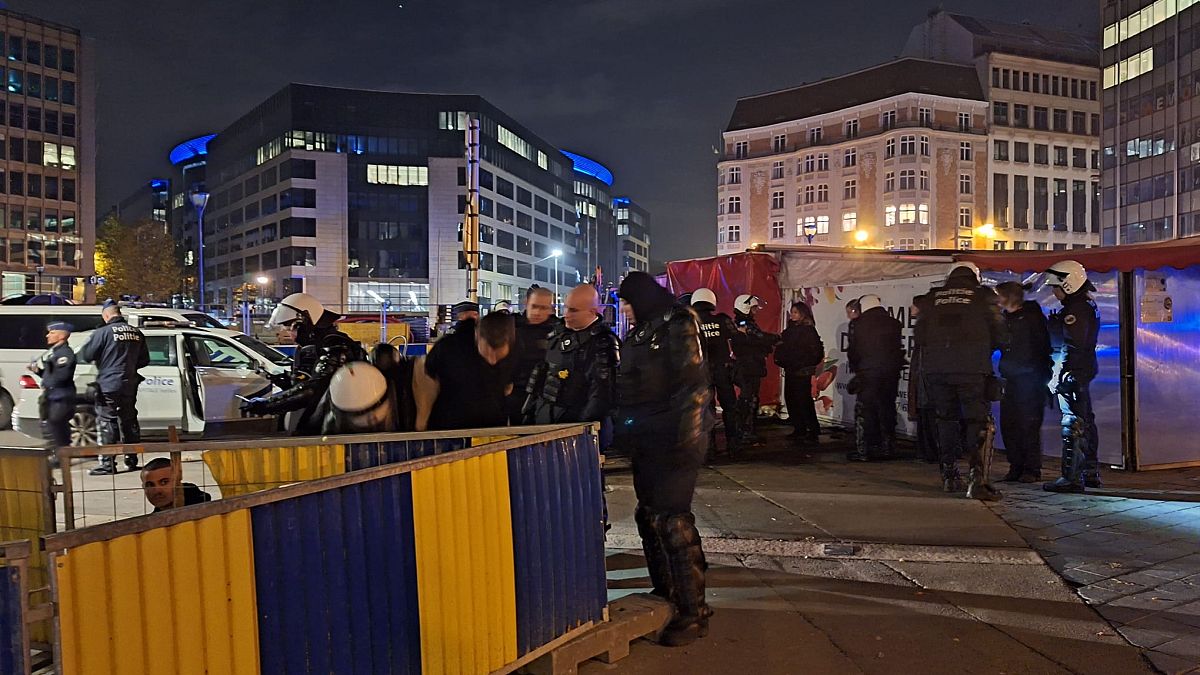In Brussels, police used water cannons against left-wing demonstrators protesting the arrival of far-right French politician Jordan Bardella. The president of the Rassemblement National is in Brussels presenting his recently published memoir. Police deployed water cannons at demonstrators after hundreds gathered in Brussels on Wednesday to protest the arrival of French far-right politician Jordan Bardella. The chairman of France’s far-right National Rally party, Bardella arrived in Belgium to present his recently published memoir. Local media reports that around 300 protesters organised by left-wing groups and from Belgian universities were met by police as they demonstrated against Bardella’s arrival. Slogans against the police were chanted and protesters set off fireworks as they tried to get through an erected barricade, when police deployed a water cannon to keep protesters at bay. Protesters moved to other parts of the city, reportedly pelting the headquarters of Belgian far-right political party Vlaams Belang. The party’s chairman shared footage on X, alleging they attacked a staff member of a company also based in the building. Bardella’s book has been on shelves since last week and has also been the root of controversy within France, with its publisher suing an advertiser which allegedly refused to run promos for book in train stations. The book’s release coincides with the trial of party leader Marine le Pen and other party members on trial for embezzling EU funds.
The tense situation unfolded in Brussels as left-wing demonstrators clashed with police while protesting the visit of far-right French politician Jordan Bardella. Bardella, the president of France’s National Rally party, was in Belgium to present his recently published memoir. The protest, organized by around 300 individuals from left-wing groups and Belgian universities, turned violent as protesters attempted to breach police barricades and were met with a water cannon being deployed by law enforcement to maintain control. The demonstrators, who were chanting slogans against the police, also targeted the headquarters of the Belgian far-right party Vlaams Belang, leading to further unrest in the city. The incident has highlighted the ongoing political tensions in Europe surrounding far-right movements and their impact on public discourse.
The use of water cannons by police against protesters has sparked criticism and debate over the handling of demonstrations and freedom of expression in Belgium. The clashes in Brussels illustrate the deep political divisions within European societies, particularly regarding the rise of far-right movements and their impact on democratic norms. Bardella’s visit and the subsequent protests underscore the challenges faced by authorities in balancing the right to protest with maintaining public order and security. The incident has also raised questions about the role of law enforcement in managing political demonstrations and ensuring the safety of both protesters and the general public. As tensions continue to simmer in Europe over issues of nationalism and populism, the Brussels protests serve as a stark reminder of the polarizing forces at play in contemporary politics.
The controversial nature of Bardella’s memoir and the public response to his visit to Brussels reflect broader concerns about the rise of far-right ideologies in European politics. The demonstrations against Bardella highlight the divisions within society over issues of immigration, nationalism, and identity, which have become increasingly prominent in political discourse. The clash between left-wing protesters and police underscores the challenges faced by democratic societies in confronting extremist ideologies and protecting democratic values. The use of water cannons against demonstrators has also raised concerns about the use of force by authorities in managing public protests and the potential for escalation in political tensions. Bardella’s presence in Brussels and the response to his visit shed light on the complexities of navigating political dissent and maintaining social cohesion in an increasingly polarized political landscape.
The aftermath of the protests in Brussels has reignited debates over the role of far-right parties in European politics and their impact on public discourse. Bardella’s visit and the subsequent clashes with protesters have brought to the forefront questions about the boundaries of free speech and the limits of political expression in democratic societies. The response of law enforcement to the protests has also sparked discussions about the use of force in maintaining public order and the potential risks of escalating tensions in politically charged environments. As European societies grapple with the challenges posed by movements like the National Rally party and Vlaams Belang, the Brussels protests serve as a reminder of the need to uphold democratic principles and protect the rights of all citizens to express their views peacefully. The incident in Brussels underscores the ongoing struggle to balance competing interests and values in a diverse and politically fractured society.
In conclusion, the protests in Brussels against the visit of far-right French politician Jordan Bardella have highlighted the deep political divisions within European societies and the challenges faced by authorities in managing political dissent. The clashes between left-wing demonstrators and police underscore the complex dynamics at play in contemporary politics, with issues of nationalism, populism, and identity shaping public discourse. The use of water cannons against protesters has raised concerns about the protection of freedom of expression and the limits of state intervention in public demonstrations. Bardella’s visit and the response to his memoir serve as a microcosm of the broader tensions surrounding far-right movements in Europe, highlighting the need for dialogue, engagement, and respect for democratic values in addressing political differences. As European societies continue to grapple with the rise of extremist ideologies, events like the protests in Brussels offer a sobering reminder of the importance of upholding democratic principles and protecting the rights of all citizens to participate in the political process.










